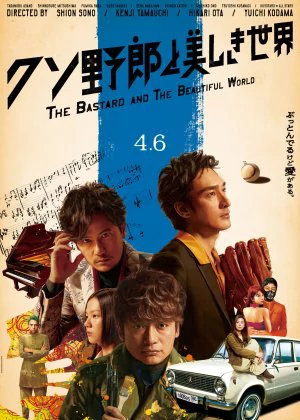The Bastard and the Beautiful World
Movie details

Sion Sono has worked himself up as Japan's primary cult representative over the years. Still, some of his films remain pretty hard to track down. The Bastard and the Beautiful World [Kuso Yarô to Utsukushiki Sekai] is an anthology project that is probably going to slip through the cracks, if only because anthology films are generally not that popular. Fans of Sono would do well to seek this one out though, not just because his entry here is hilarious, the rest of the shorts are pretty great too, offering a little glimpse of Japan's directorial talent waiting to break through.
![screen capture of The Bastard and the Beautiful World [Kuso Yarô to Utsukushiki Sekai]](/thumbs/img/articles/1200xauto/bastard-beautiful-world-1.webp)
Anthologies are relatively popular in Japan, maybe because they tend to use the format to its fullest strength. Directors see it as a prime opportunity to show their worth, take a few chances (as failure is less dramatic) and try to stand out, rather than blend in. This often makes these projects somewhat uneven, but it also means there's a much bigger chance of greatness, creativity and diversity in the span of 90-120 minutes. The Bastard and the Beautiful World's approach does differ a little from the classic format, as there's no true wrap-around segment, but a (loose) conclusion tying the different shorts together. A novel take that helps to set the film further apart from its peers.
First up is Sion Sono himself, and boy does he have fun with his short. Don't Shoot the Pianist is a real blast, pure and unfiltered entertainment that aims to amuse and delight, nothing more. It's a film that thrives on bold and colorful visuals, madcap characters and a slightly absurd plot, centered around the mysterious Fujiko, a girl who bewitches all men she gets close to. Fujiko has her mind set on a pianist, but before they can hook up, she's taken away by a strange, commanding Yakuza boss. With people like Tadanobu Asano and Denden on board, Sono has his cast in order. The sets look amazing, the comedy is solid and the pacing is extremely slick. This kind of work is exactly why I love these anthology projects so much. 4.5*/5.0*
![screen capture of The Bastard and the Beautiful World [Kuso Yarô to Utsukushiki Sekai]](/thumbs/img/articles/1200xauto/bastard-beautiful-world-2.webp)
The second short film comes from Kenji Yamauchi and is probably the most conceptual of the bunch. Shingo-chan and the Song-Eater is a pretty apt title, as the film tells of a girl that feeds on songs (and art in general). She roams the streets of Tokyo, everywhere she hears people sing, she eats their music, leaving the artists unable to remember the words and melodies of their work. Things get a lot weirder throughout the short, but Yamauchi's delivery is surprisingly dry and factual. The colors are more muted, the storytelling is very matter-of-factly, and the characters seem very accepting of their strange fate. This won't be for everyone, but I had some good chuckles along the way. Though a very interesting and accomplished short, I do think this was the weakest entry for me. 3.5*/5.0*
Hikaru Ôta's Going to the Light is no doubt the most dramatic of the bunch, but it still sports a pretty absurd premise. It's definitely not a vintage Japanese drama, but it does take a few notes from the genre. The short follows a couple who have lost their son, a young baseball prodigy. When they find out that his arm was donated to another person, they set out on a wild goose chase to locate the recipient. While the film only seems to answer to internal logic, the drama side is actually pretty well-developed. Performances are fine, the film looks pretty stylish and there is some light comedy scattered throughout, to keep the film from becoming too dark. It's a very nice resting point between all the zanier shorts that surround it. 4.0*/5.0*
![screen capture of The Bastard and the Beautiful World [Kuso Yarô to Utsukushiki Sekai]](/thumbs/img/articles/1200xauto/bastard-beautiful-world-3.webp)
The final short film is somewhat of an oddity. It's not so much a wrap-around segment as it is a wrap-up segment. Yûichi Kodama's A New Poem brings the characters of the three different shorts together in a nondescript party setting, while also serving the actual conclusion to each short film. Though I personally appreciated the somewhat wacky cliffhangers (and didn't necessarily need true conclusions), I did like the idea of this alternate approach. Kodama's short is pretty colorful, both stylistically and the characters it adds. There's not much actual plot or depth here, then again the entire anthology seems eager to underline its primary focus on entertainment. A very enjoyable conclusion to a very fun anthology. 4.0*/5.0*
The Bastard and the Beautiful World has everything I expect from a good anthology film. It is eclectic, creative, no weak links and each short comes with its own fun surprises. It probably won't be enough to convince people who haven't been won over by the concept in the first place, as the consistency is pretty weak and the mood of the films might be a tad too varied. Fans of anthology projects, Japanese comedy/surrealism and/or Sion Sono on the other hand should do themselves a favor and seek this film out, before it is buried for good.